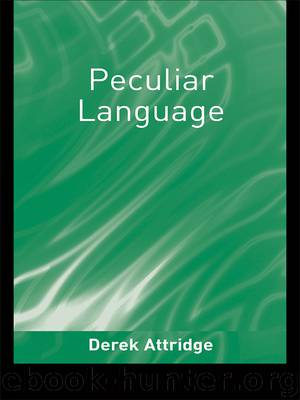Peculiar Language by Attridge Derek;

Author:Attridge, Derek;
Language: eng
Format: epub
Tags: ebook
Publisher: Routledge
Published: 2011-10-18T16:00:00+00:00
Chapter 5
Literature as Imitation: Jakobson, Joyce, and the Art of Onomatopoeia
Hermogenes or Cratylus?
AT about the same time that Saussure’s Course in General Linguistics . was being put together from students’ notes, the twentieth century’s most thoroughgoing endeavor to specify an objective distinction between literary and other uses of language was initiated in Russia. The Moscow Linguistic Circle was founded in 1915 and, in St. Petersburg, the Society for the Study of Poetic Language (OPOJAZ) was formed the following year. After the mid-1920s the movement weakened in Russia, partly because of official opposition, but the Prague Linguistic Circle, founded in 1926, pursued many of the same goals for another two decades.1 The major link between what became known respectively as Russian Formalism and Prague Structuralism was the figure of Roman Jakobson who, having played a leading role in the Moscow Linguistic Circle, moved to Czechoslovakia in 1920. Although within and between these groups and movements there were wide differences, both among individuals and over time, the theorists concerned were held together by a consistent concern with the question of “literariness,” the features or functions that could be said to distinguish literature as a special form of language. Jakobson continued to stress this question, and refine his position on it, throughout his long career. Between 1941 and his death in 1982 he lived and taught in the United States, where he played an important part not only in the development of linguistic (especially phonological) theory but in the growth of stylistics as a discipline.2
His most influential pronouncement on the subject of the distinctiveness of literary language (which for Jakobson, as for Puttenham, primarily meant poetic language)3 was the paper “Linguistics and Poetics,” given as a closing statement to a conference on stylistics in 1958.4 Here Jakobson asserted that the “poetic function” entails a set (or “Einstellung”) not toward what he called the context of a message, not toward the addresser or addressee, not toward the code shared by the addresser and addressee or the contact that enables them to stay in communication, but toward the message as such. The poetic function is not peculiar to poetry, but in poetry it becomes dominant, constituting the defining feature, just as the other orientations, when they dominate, produce respectively the referential, emotive, conative, metalingual, and phatic functions (353–57).5
Interpreting Jakobson’s gnomic formulation “the set toward the message as such” necessitates careful consideration of the contrast he makes between what he calls the “context” (the orientation toward which is the “referential” function) and the “message.” In the 1920s he used the Husserlian term “expression” instead of “message” in similar formulations, in what appears to be an attempt to isolate meaning that is present as an inherent part of the sign in contradistinction to a more strictly referential meaning.6 The “message” thus includes not only the chain of material signifiers, aural or visual, organized into grammatical relations with one another but also their meanings as given by the linguistic system, though without reference to the world beyond language.
Download
This site does not store any files on its server. We only index and link to content provided by other sites. Please contact the content providers to delete copyright contents if any and email us, we'll remove relevant links or contents immediately.
Joan of Arc by Mary Gordon(3781)
Victory over the Darkness by Neil T. Anderson(2727)
The Gnostic Gospels by Pagels Elaine(2390)
Devil, The by Almond Philip C(2198)
The Nativity by Geza Vermes(2110)
The Psychedelic Gospels: The Secret History of Hallucinogens in Christianity by Jerry B. Brown(2071)
Going Clear: Scientology, Hollywood, and the Prison of Belief by Lawrence Wright(1880)
Going Clear by Lawrence Wright(1865)
A TIME TO KEEP SILENCE by Patrick Leigh Fermor(1768)
Barking to the Choir by Gregory Boyle(1725)
Old Testament History by John H. Sailhamer(1711)
Augustine: Conversions to Confessions by Robin Lane Fox(1683)
A History of the Franks by Gregory of Tours(1635)
The Bible Doesn't Say That by Dr. Joel M. Hoffman(1606)
A Prophet with Honor by William C. Martin(1600)
The Knights Templar by Sean Martin(1596)
by Christianity & Islam(1559)
The Amish by Steven M. Nolt(1488)
The Source by James A. Michener(1454)
